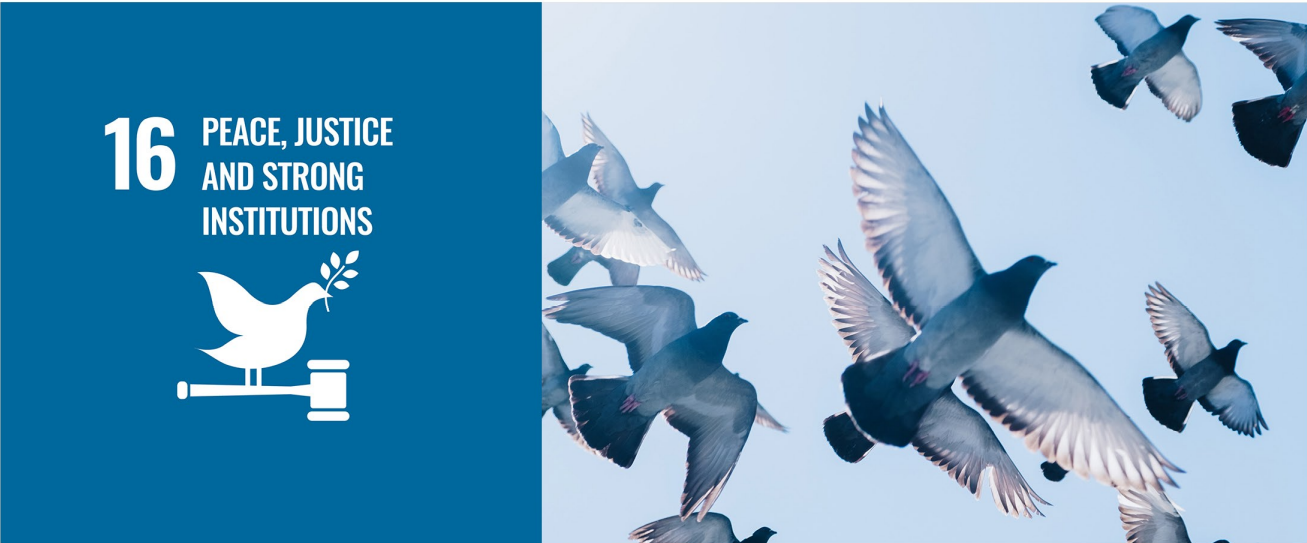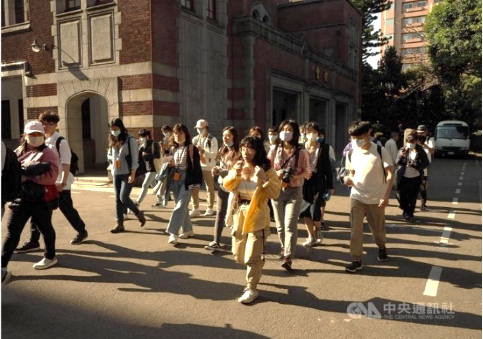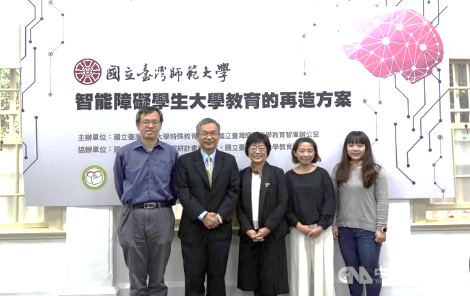

16.1 Spirit of the SDG and the University’s Philosophy
SDG 16 aims to solve the challenges of unfairness and justice in human society and to build a more peaceful and inclusive society. The first step in protecting individual rights is to establish larger numbers of independent national human rights institutions to speak out for vulnerable and marginalized groups. A morally right and fair legal system can guarantee everyone’s freedom and equality, and resolve the threats posed by violence, which is critical to constructing a sustainable and peaceful society. The University actively promotes awareness of fairness and justice in the curriculum and campus life, and holds campus democratic elections that are fair and open. Speeches on related topics are often used to encourage students to spontaneously conduct research on justice issues and related activities. The teaching and research staff at the University also make suggestions to the government, which further promotes the fair and just development of society.
16.2 Achievements
Developing a representative system on campus to ensure the principles of fairness and justice
NTNU established a system to ensure that campus democratic elections are carried out in accordance with the applicable regulations. The representatives in the institution-activities meetings of the University come from different levels on the campus, focusing on the opinions and rights of units at each level. The president, vice-president, dean of each school, and other first-level supervisors, as well as representatives of teachers, researchers, teaching assistants, other staff, workers, and students participate together. As an example, student representatives accounted for 10.7% of the total number of committee members. Organizations on campus and student union organizations also follow the relevant regulations including in terms of fairness and openness.
Planning fair and morally correct activities and courses
NTNU promotes the awareness of fairness and justice in its courses and other activities, and encourages campus units to provide fairness- and justice-related speech activities and courses. The curriculum of the General Studies Center at NTNU attaches importance to civic literacy and encourages students to explore related topics, and cultivate the knowledge, attitudes, and skills required to participate in public activities. Films and lectures are often held to promote reflection on social justice issues, and faculty and students are invited to discuss social issues. For example, the History Department lectures on justice issues, while the Office of Student Affairs, Extracurricular Activities Team, and Student Union hold lectures on “Student Rights and Campus Public Participation,” inviting members to give speeches and share their experience in participating in public activities.
Holding justice lectures to trigger students to think about fairness and justice
The Indigenous Peoples Research and Development Center invites prodemocracy activists to discuss issues related to Chinese ethnic minorities with students, and use this topic to guide students to think about their historical context and trigger speculation about social fairness and justice.
Professors actively participate in public activities and assist in the formulation and development of national policies
Professors at NTNU are actively participating in public activities, especially in education policy. In 2020, the University held four press conferences on education policy suggestions, entitled “Taiwan’s Policy Recommendations for Bilingual National Education,” “Reconstruction Plan for University Education for Students with Mental Disabilities,” “Survey on Trends in International Mathematics and Science Education Achievement,” and “New Typhoon, New Bilingualism.” Based on the research results and surveys, the University provides advice to the government for policymaking, which benefits the country and its social development.
Implementing institution activities information disclosure, and strengthening self-responsibility and supervision mechanisms
Institution activities disclosure information items are increasing each year. By 2020, 132 such items had been published, 92 data sheets (libraries) were interfaced, and an automated filing system was planned to provide correct, consistent, and timely information about institution activities.
16.3 Featured Highlights
16.3.1 Free style of study that encourages exploration of the value of justice
NTNU has a free study style. History students automatically initiate organizations to review history and look for scenes of the June Fourth Incident at NTNU and the White Terror from decades ago. In addition, scholars are also invited to give speeches. For example, the speech “How to See?—Historical Truth and the Use of Archives” explained that the disclosure of archives is a necessary process of transformational justice. Although there are concerns about it splitting society, disclosure is necessary to achieving tolerance and further reconciliation.
Related Media Coverage


16.3.2 NTNU often provides expert advice and suggestions to the government
NTNU is a research-oriented university, and research faculty members are often consulted about government policies to provide specific expert advice to the government. They are invited by the government to serve on advisory committees or as consultants to public institutions. Teachers and researchers publish their own publications based on the research results, and provide advice about public activities.
The press conferences on education policy suggestions conducted in 2020 included the following:
March 12: Policy recommendations for advancing Taiwan towards becoming a bilingual nation
November 11: Press conference on “Re-engineering plan for university education for students with intellectual disabilities”
December 24: Press conference on “Taiwanese Hokkien, the new bilingual system”


16.3.3 Councilors talk about academic rights and encourage NTNU students to care about campus justice
The Student Union and the Office of Academic Affairs jointly held a lecture on “Student Rights and Campus Public Participation,” inviting a New Taipei City councilor to share her experiences as the president of the Graduate Student Association, fighting for student rights, and using her own experience to encourage NTNU students to care about student rights and increase participation in campus public affairs.
Related Media Coverage
16.3.4 Prodemocracy activists and students talk about ethnic minorities, and dig deeper into the vanished history
The College of Liberal Arts invited a prodemocracy activist to discuss issues related to Chinese ethnic minorities with students. He started discussing the history of the Uighurs and related issues arising from the involvement of the Chinese Communist Party in Uighur society. This topic was used to guide students to think about its historical context and trigger speculations about social fairness and justice.

